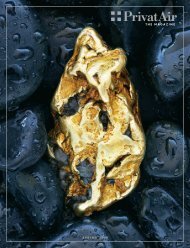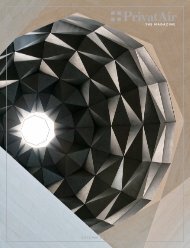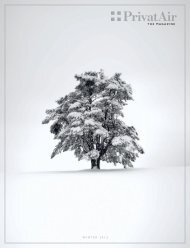january-2012
january-2012
january-2012
You also want an ePaper? Increase the reach of your titles
YUMPU automatically turns print PDFs into web optimized ePapers that Google loves.
and dive through windows,’ Rose had told me). Before we set<br />
off into the wilds, Andy and Terry, armed to the teeth with a<br />
battery of deterrents, gave a strict safety briefi ng. Polar bears are<br />
unpredictable, we were warned – forget the myth that they<br />
always attack from behind. If threatened, don’t run and don’t<br />
play dead. Th e fi rst line of defence is to shout at the bear, then<br />
to throw stones at it (apparently, they do not like to be<br />
touched). If that fails to stop an advance, ‘screamers and<br />
bangers’ are fi red at it. As a last resort, a shotgun is used. ‘It will<br />
not hurt the bear at a distance,’ explained Terry, ‘but at close<br />
quarters, if he keeps charging, it will kill him. It is a much<br />
better option than a rifl e, which would require a very accurate<br />
aim. A bear’s skull is thick and angled in such a way that it<br />
defl ects bullets.’ Happily, in their combined 20-odd years of<br />
experience with polar bears, neither Terry nor Andy have had<br />
cause to shoot one of these magnifi cent creatures.<br />
Th us briefed, we set out in hushed single fi le, over spongy<br />
ground fragrant with berries and wild fl owers, solid permafrost<br />
just 50cm beneath us, in search of bears. Th e distinctive bugle<br />
call of sandhill cranes accompanied us, while cheeky sik-siks<br />
– Arctic ground squirrels – stood sentinel on rocks, vanishing at<br />
our approach. Overhead, a bald eagle soared, surveying the<br />
scene as an Arctic hare made its escape, bobbing white tail a<br />
bull’s-eye for predators.<br />
From July to November, having swum ashore from the<br />
melting ice, polar bears are in a state of ‘walking hibernation’,<br />
their digestive systems switched off unless food (like the hapless<br />
whale) falls into their laps. ‘Th ey are conserving energy,’ said<br />
Andy, ‘but it is a state they can control.’ Sure enough, we soon<br />
PRIVATESCAPE<br />
Can we just ify trespassing on the territory of an animal<br />
for our pleasure, if it then kills in self-defence?<br />
Sixty-Eight<br />
reached a ridge where a furry white heap lay dozing among<br />
brilliant purple fi reweed, a huge paw batting away the noisome<br />
bugs. Sensing us, the bear sat up, stretched his neck to sniff the<br />
sky, and settled down again, legs in the air, unfazed by our<br />
presence 40 metres away. ‘He is quite relaxed,’ said Andy, ever<br />
alert for trouble. ‘Warning signs are yawns and fl attening of ears.’<br />
We came across a mother vigilant over her nervous cubs,<br />
and we followed the hairy rump of an adolescent male, making<br />
swaggering, pigeon-toed progress deftly over granite boulders<br />
where the tide had receded. One magical evening, a bear came<br />
snuffl ing up to the dining-room windows, drawn by the<br />
mouth-watering aroma of our barbecuing ribs. I watched him<br />
loiter hopefully, then swim away into the setting sun, a white<br />
speck in the silvery ocean, disappearing towards the horizon.<br />
Mother Nature is unbiddable, and we were fortunate to<br />
have had so many sightings. Th e sacrifi cial whale no doubt had<br />
something to do with it, and aff orded us the rare treat of seeing<br />
bears in action, successively sizing each other up in displays of<br />
dominance and eviction; or taking the path of least resistance<br />
and sharing the windfall. It was a primal scene, a gory banquet<br />
such as Sir David Attenborough might have waited months to<br />
capture on fi lm. Above all, it was a salutary reminder that these<br />
beautiful, alluring creatures are the world’s largest and most<br />
fearsome land carnivores, to be treated with the utmost<br />
circumspection and the respect they deserve.<br />
Teresa Levonian Cole travelled with Frontier Canada,<br />
+44 (0)20 8776 8709, www.frontier-canada.co.uk.<br />
Th e best time to see polar bears at Seal River is July/August and<br />
October/November. For further info: www.churchillwild.com






